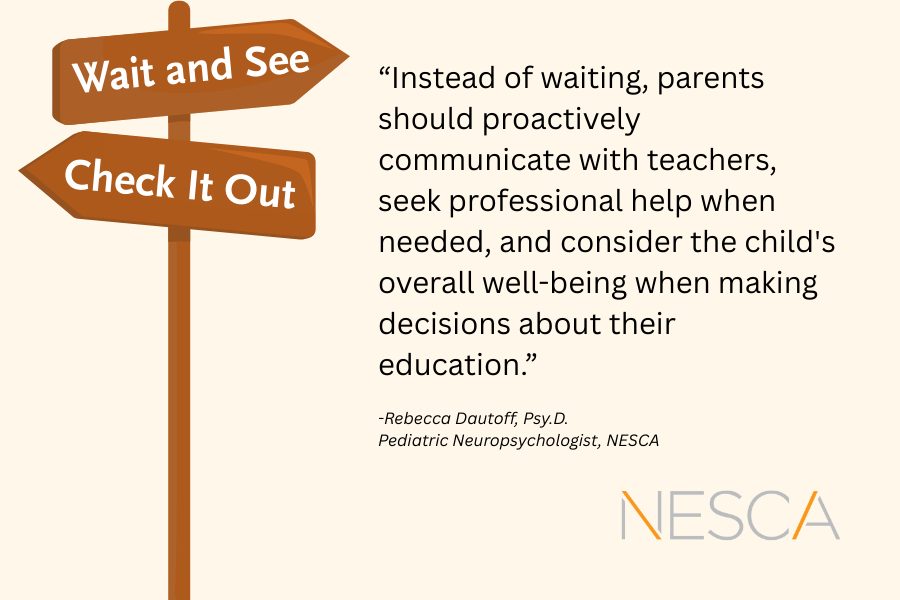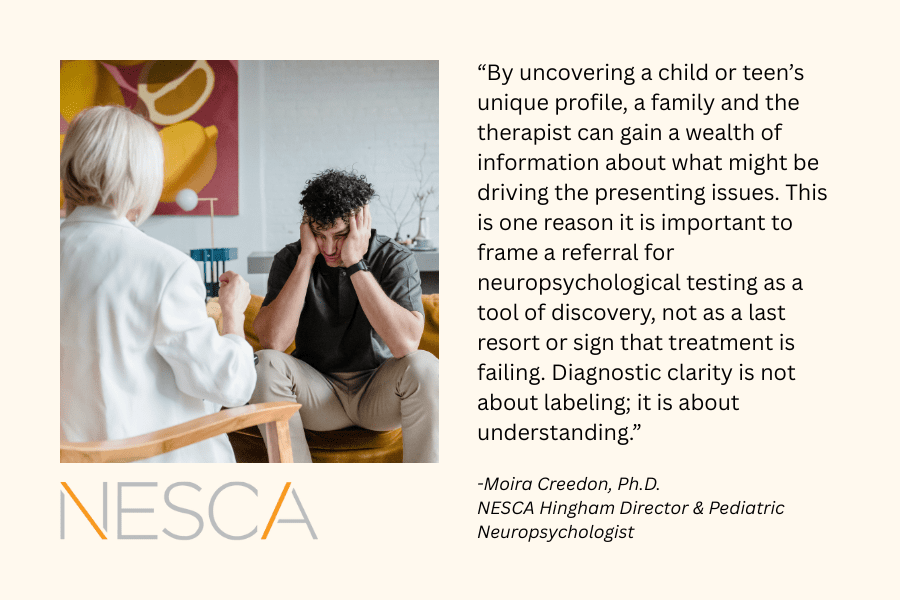
 By: Rebecca Dautoff, Psy.D.
By: Rebecca Dautoff, Psy.D.
Pediatric Neuropsychologist, NESCA
As a child psychologist, I regularly advise parents that our job is not to eliminate their children’s frustration, anxiety, and disappointment. Instead, our goal is to help kids process and tolerate these emotions. In fact, it’s critical that children face obstacles so they can learn to navigate and endure challenges throughout their life. But what happens when a child has a particularly tough time at school or a really difficult year? What are the next steps?
Deciding what to do can be a hard decision for concerned parents. Some parents question whether they should “do something” to help the child, or to relieve their own anxiety and guilt. Other parents feel that their child’s issues are due to “a bad fit” with a particular teacher or classroom structure. This can be even harder when the school tells parents that everything is okay, or it’s just a phase that they see all the time. In some cases—such as a child grieving or adjusting to a new school—a short observation period (a few weeks) with close monitoring and open communication can be appropriate. However, this should always come with a clear plan to seek help if things don’t improve, because the “wait and see” approach can pose real risks to a child’s development, mental health, and emotional well-being. Here’s why:
First, childhood is full of developmental windows. These are essentially periods of time or opportunity when the brain is especially receptive to learning a specific skill. If a child is struggling in one of these areas and we wait too long, we risk missing this period of optimal learning. Language delays are a clear example. There is a critical period of language development before the age of 3, meaning that intervention for speech and language challenges are most effective before this age.
Second, children are incredibly perceptive. Kids are highly attuned and hyper aware when they feel like something is harder for them than it is for their friends and classmates. Often, kids internalize their struggles as personal failures. This can lead to frustration, anxiety, withdrawal, or behavioral problems/acting out. These outcomes are even more likely if a child is late to learn a skill. Take reading as an example. If a child is learning to read more slowly than their peers in first or second grade, they are less likely to internalize this as a problem because most of their classmates are also learning to read. It might come more easily to their friends, but they are all learning to read. If we wait to intervene, and a child is still having difficulty with reading in fourth grade, they are more likely to internalize their difficulty as a personal failure because they are no longer surrounded by peers who are also working on the same skill.
Taking a wait and see approach with your child’s mental health can feel like a cautious or hopeful strategy—especially when you’re unsure if something is truly wrong. Unfortunately, mental health conditions are often progressive, and waiting to treat them can allow symptoms to worsen, which makes them harder to treat. Undiagnosed mental health issues can lead to poor academics, social withdrawal, bullying, or acting out. The child may fall behind developmentally or struggle to make or keep friendships, which will impact their self-esteem and exacerbate their mental health issues. In older children and adolescents, we also see untreated mental health issues lead to more dangerous problems, like substance use, self-harm, eating disorders, or suicidal thoughts.
Instead of waiting, parents should proactively communicate with teachers, seek professional help when needed, and consider the child’s overall well-being when making decisions about their education.
What to Do Instead Of “Wait and See”:
- Talk to your child: Open the door to conversation and let them know you’re there.
- Keep track of behaviors, moods, or changes.
- When in doubt, check it out: Even a single consultation with a pediatrician, school counselor, or therapist can provide guidance without committing to long-term treatment. If you suspect there is a deeper learning, emotional, developmental, or behavioral issue, a neuropsychological evaluation can also determine the root cause of the issues and set you and your child on a better path forward.
About the Author
Dr. Rebecca Dautoff provides comprehensive neuropsychological and psychological (projective) evaluation services for children, adolescents, and young adults who have complex presentations with a wide range of concerns, including attention deficit disorders, psychiatric disorders, intellectual disabilities, and autism spectrum disorders (ASD). She also values collaboration with families and outside providers to facilitate supports and services that are tailored to each child’s specific needs.
and young adults who have complex presentations with a wide range of concerns, including attention deficit disorders, psychiatric disorders, intellectual disabilities, and autism spectrum disorders (ASD). She also values collaboration with families and outside providers to facilitate supports and services that are tailored to each child’s specific needs.
If you are interested in booking an appointment for an evaluation with Dr. Dautoff or another NESCA neuropsychologist/clinician, please fill out and submit our online intake form.
NESCA is a pediatric neuropsychology practice and integrative treatment center with offices in Newton, Plainville, and Hingham, Massachusetts; Londonderry, New Hampshire; the greater Burlington, Vermont region, serving clients from infancy through young adulthood and their families. For more information, please email info@nesca-newton.com or call 617-658-9800.

